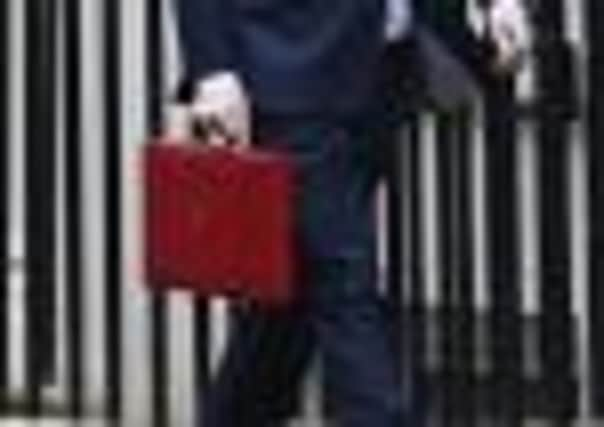Budget 2013: Surprise corporation tax cut welcomed


Financial markets and business organisations also welcomed Chancellor George Osborne’s promise to pump £3 billion into Britain’s infrastructure, heeding calls from organisations such as the CBI.
However, amid continuing economic headwinds and the new crisis in eurozone member Cyprus, City economists were disappointed that the Chancellor cut his growth forecast for this year to 0.6 per cent – half the rate he predicted only last autumn.
Advertisement
Hide AdAdvertisement
Hide AdCity professionals reacted coolly to his confirmation that the Bank of England’s monetary policy committee (MPC) was to extend its remit to include other measures.
The latest corporation tax cut came out of left-field, however. The CBI did not call for a reduction in its pre-Budget submission after the government recently cut the rate to 24p and had promised a rate of 21p in 2014.
One equities market strategist said: “This latest corporation tax cut is a good boost. The City likes it because the more earnings companies retain the more there is for dividends and investment.
“It was one of the standouts of the Budget for us.”
Simon Walker, director general of the Institute of Directors (IoD), said: “Businesses will be glad that Osborne has continued the downward pressure on corporation tax.
“Britain must become the most competitive place to do business, and lower taxes will attract welcome investment from abroad.”
The British Bankers Association (BBA) took on the chin Osborne offsetting the latest corporation tax cut with an increase in the bank levy from 0.13 per cent to 0.142 per cent.
A BBA spokesman said: “The government has previously said that it both wants the bank levy to raise a specific amount – £2.5bn – and that any reduction in corporation tax will be offset by an increase in the levy. That is what has happened.” On the abolition of stamp duty on Aim shares, Neil Pamplin, chairman of the Quoted Companies Alliance trade body, said he was “delighted” the government had “taken a proactive approach towards stimulating investment in growing companies”.
Daniel Godfrey, chief executive of the Investment Management Association, whose members manage nearly £4 trillion, said the abolition of stamp duty on funds “will give savers better returns” and was “a vital step in allowing the UK to compete as a location for funds”.
Advertisement
Hide AdAdvertisement
Hide AdTo Tory cheers, Mr Osborne crowed in his speech that it showed Britain was abolishing a financial transaction tax just as the Europe was creating one.
Even though the Chancellor reduced projected UK economic growth rates for 2014 (down from 2 per cent to 1.8 per cent) and 2.3 per cent in 2015, many City economists branded the forecasts optimistic, saying Mr Osborne had been forced to tear up his previous economic forecasts for his fourth consecutive Budget.
Howard Archer, chief UK economist at IHS Global Insight, said: “Yet again, the Budget contains the unappetising and depressing combination of reduced growth and higher public deficit forecasts”.
He added: “The growth forecast for 2013 looks entirely realistic, but we have doubts that the economy can achieve the projected expansion rates from 2014 onwards.”
Another economist said: “The government is making forecasts four and five years ahead for GDP, when history shows they are having to consistently trim forecasts made three and six months before.
“It is throwing darts at the dartboard in the dark, really.”
There was grim acknowledgement at the Chancellor’s admission that Britain’s £1.2 trillion of national debt is to spiral up to 85 per cent of GDP in 2016-17 and not start coming down until 2017-18.
That is two years behind schedule and a year longer than Mr Osborne forecast only a little before last Christmas.
Advertisement
Hide AdAdvertisement
Hide AdThere was widespread support for the Budget measure for a new employment allowance to cut national insurance bills by £2,000 for every firm, meaning that 450,000 small businesses will pay no national insurance at all.
“The £2,000 reduction in national insurance lowers significantly what has been a huge barrier on jobs and wealth creation,” Gerald Smith, partner at business restructuring firm, FRP Advisory, said.
On Mr Osborne’s plan to alter the Bank of England MPC’s remit to allow it to explain “trade-offs” with its inflation target, and give steers on long-term interest rates, George Buckley, economist at Deutsche Bank said: “I’m not sure that this changes anything at all … this is probably the absolute least they could have done after what they suggested.”
Amit Kara said the change, aired before Mark Carney succeeds Bank of England Governor Sir Mervyn King this summer, would have only “a marginal impact on economic growth”.
Markets were relatively unstirred by the Budget, with the FTSE-100 index closing down 8.62 points at 6,432.7.